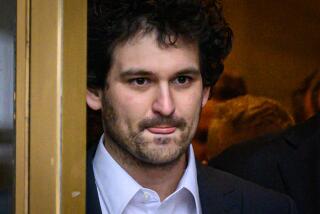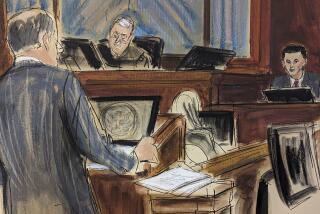Fund manager Jeffrey Gundlach testifies he didn’t need TCW data to start rival firm
- Share via
On trial for allegedly stealing trade secrets from his former employer, star bond fund manager Jeffrey Gundlach told a jury that he had no need to use TCW Group Inc.’s data because there was nothing special about it.
Under questioning by his own attorneys for the first time in the grueling court battle, Gundlach said Monday that the TCW system for evaluating complex bonds used “the same data everyone else looked at.”
The value that TCW offered investors, Gundlach said, was what he had in his head after 24 years at the Los Angeles firm, not what was in a computer system.
In his second day on the stand in Los Angeles County Superior Court, Gundlach sought to refute TCW’s central allegation against him: that he and three lieutenants needed the firm’s proprietary information to set up a rival money-management business.
TCW fired Gundlach as chief investment officer in December 2009. Ten days later he formed DoubleLine Capital, and most of his bond-team members from TCW quickly jumped ship to join him.
DoubleLine has attracted $14 billion from investors in just 20 months, a dramatic growth rate for a financial start-up firm.
TCW, which manages about $120 billion in assets, sued Gundlach and his lieutenants in January 2010 alleging that they breached their fiduciary duties to the company, conspired to abandon the firm and stole massive amounts of data on their way out.
Gundlach, 51, countersued, accusing TCW and its parent firm, French bank Societe Generale, of firing him to cheat him out of a huge chunk of promised income. He denies using any TCW secrets to create DoubleLine. Each side is seeking hundreds of millions of dollars in damages from the other in the civil jury trial.
Earlier Monday, Gundlach’s testimony also revealed the extent to which he was in preliminary discussions in 2009 about joining with another major money manager, Pasadena-based Western Asset Management Co., also known as Wamco.
Gundlach, who has built a reputation as one of the country’s savviest investors in mortgage-backed bonds, has said publicly that he was talking with other financial companies in 2009 amid concerns about TCW’s future under its French parent.
But he has continually denied that he was plotting all along to leave the firm, as TCW alleges.
Wamco, a large investor in bonds and other fixed-income securities, called him in February 2009, Gundlach testified.
John Quinn, TCW’s lead attorney in the case, asked Gundlach if he had signed a confidentiality agreement with Wamco as the negotiations proceeded.
“I’ve heard of confidentiality agreements. I’m not really familiar with them,” Gundlach said.
Quinn then showed the jury a copy of a Wamco confidentiality agreement that was signed by Gundlach.
“They were going to share their information with me,” Gundlach said of Wamco. He said he didn’t provide any of the numbers that Wamco used in trying to determine what amount of assets Gundlach and his team might bring from TCW to Wamco if they struck a deal.
“I remember wondering where they came up with them,” Gundlach said of Wamco’s numbers.
In a combative back-and-forth with Quinn, Gundlach said he began talking with Wamco only because Societe Generale had disclosed early in 2009 that it expected to sell or spin off TCW within five years. He wasn’t sure what that would mean for him or his team, Gundlach said. “I was scared,” he told the jury.
He said he envisioned a deal with Wamco that would allow TCW to keep a share of the revenue from any assets that shifted to Wamco with Gundlach and his team. “The idea was … that it could be a win-win situation for everyone,” Gundlach said.
Asked if he got a follow-up letter from Wamco, Gundlach said that in June 2009 he got “another proposal, which I never read. I looked at it briefly.”
Gundlach had testified last week that he believed that TCW founder and Chairman Robert Day, 67, and Chief Executive Marc Stern, 66, in June 2009 were pursuing a “dividing and conquering” strategy, seeking to lay the groundwork for ousting Gundlach while retaining his longtime fund co-manager, Phil Barach.
At a confrontational meeting with Stern on Sept. 3, 2009, Gundlach said he and his top aides in effect told Stern that “if you fire me you’re going to blow up the business.”
Gundlach, who estimated on the stand Monday that his personal net worth was “maybe” about $90 million, said he offered to buy 51% of TCW from Societe Generale for $350 million, half in cash and half with a loan that he wanted Societe Generale to finance.
Societe Generale has said that it didn’t believe Gundlach’s offer was serious, and the conversation never went further.
But by that point, hadn’t he resolved to leave TCW? Quinn asked Gundlach.
“That is not true at all,” Gundlach shot back.
Quinn then showed the jury an email Gundlach had sent Sept. 5, 2009, to one of his co-defendants, Barbara VanEvery.
“This whole fire drill of a week has helped me to fully see that I will be forever vulnerable as long as I stay at a place that thinks it owns and controls the revenue stream,” Gundlach said in the email. “Eliminating that vulnerability is the goal now.”
Quinn and Gundlach then sparred over their perceptions of Gundlach’s responsibility to TCW as a senior officer.
The revenue generated by assets Gundlach managed was “a shared revenue stream between me and TCW,” he said.
“Did the clients send in the checks to Jeffrey Gundlach Inc.?” Quinn asked.
“No,” Gundlach said.
Gundlach will be on the stand again Tuesday.
More to Read
Inside the business of entertainment
The Wide Shot brings you news, analysis and insights on everything from streaming wars to production — and what it all means for the future.
You may occasionally receive promotional content from the Los Angeles Times.










